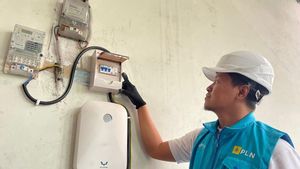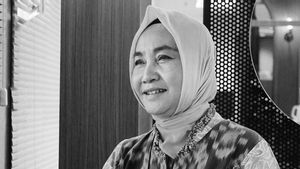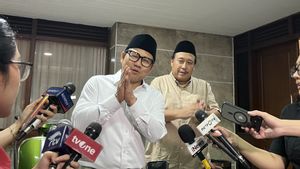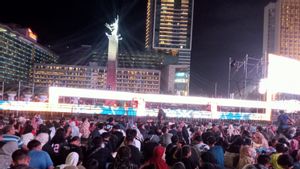JAKARTA - Nana Mirdad has been living in Bali for almost 13 years with her husband, Andrew White. As a form of concern for the Island of the Gods, Nana also supports planting 5,000 seeds in the Mangrove Pemogan Forest Area, Bali.
According to Nana, preserving nature must involve young people. "We have to want it, don't be a young generation who close their eyes, we have to want to make the world better, never think there is no impact (the impact)," said Nana in a virtual press conference, Wednesday, August 31.
Young people can become agents of change by transmitting correct information about the importance of mangroves for coastal areas. "Maybe for us it's small, but if there are 1 or 2 people who listen or 100 people it will still have a good impact. When we influence something, never feel inferior, because everyone basically has power," said Nana again.
The planting of 5,000 seeds in the Mangrove Pemogan Forest Area, Bali is a continuation of the mangrove ecosystem conservation program that has been run by Djarum Trees for Life (DTFL) since fourteen (14) last year, and has succeeded in planting more than one (1) million mangroves along the northern coast of Java Island.
DTFL cooperates with the Directorate of Land and Mangrove Water Rehabilitation, the Directorate General of Watershed Management and Forest Rehabilitation, the Ministry of Environment and Forestry; Bali Provincial Government; academics; young figures who care about the environment, as well as 150 students who are members of theaware Area, an environmentally conscious community initiated by the Djarum Foundation at the end of 2018.
Since 2008, DTFL has seriously encouraged the rehabilitation and conservation of mangroves, starting from Mangkang, Semarang, Central Java. In addition to planting, DTFL also provides assistance to the community to ensure that the seeds planted can grow optimally, considering that these seeds are prone to being carried away by tidal currents.
Mangrove is one of the central plants in handling climate change due to the wealth of physical, ecological, social, economic functions. Mangrove conservation efforts must be sustainable considering that plants living in these waters are vulnerable to damage, both naturally and due to human activities. Indonesia, which has a mangrove area of up to 22.6 percent of the world's total, plays a very large role in the absorption of carbon emissions from mangroves. Therefore, we will always be committed to supporting the government's efforts to preserve mangroves in Indonesia," said FX Supanji, Vice President Director of the Djarum Foundation.
"Mangroves have the ability to store carbon reserves 4 to 5 times greater than forest plants on land, so that if more mangrove land is cleared, it will further assist in climate control. To maximize this value, cooperation from various parties, from ministries, academics to private roles is needed," said Director of Land and Mangrove Water Rehabilitation, Directorate General of Water Management and Forest Rehabilitation, Ministry of Environment and Forestry, Ir. Inge Retnowati, MI.
"Mangrove plays a major role in controlling climate change because it is able to store and absorb carbon four to five times more than mainland tropical forests. This activity is a form of real mangrove planting action, as a symbol of environmental sustainability efforts to reduce the effects of climate change, as well as a form of concern for the preservation of mangrove forests. Bali students' involvement in this event is also a positive thing to better understand mangrove conservation. With the pandemic, they are moved to encourage its sustainability for the next years," said Bali Governor, I Wayan Koster, represented by Assistant Government and Welfare, Secretary of Bali Province, I Gede Indra Putra, SE., MM.
After plants grow at the age of 10, people can also take advantage of the use value directly from mangrove forests for crab cultivation, as well as produce various derivative products with a value of Rp. 17 million per Ha per year. In addition, the community can also receive benefits for indirect value from the ecotourism and other environmental services sectors up to Rp. 87 million per Ha per year. This is projected to drive the economy, with a total of Rp. 104 million per year.
The English, Chinese, Japanese, Arabic, and French versions are automatically generated by the AI. So there may still be inaccuracies in translating, please always see Indonesian as our main language. (system supported by DigitalSiber.id)









